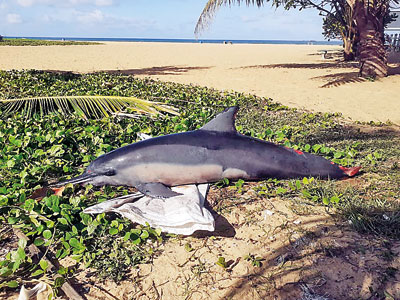News
Panadura’s tailless dolphin exposes bycatch brutality
View(s):By Malaka Rodrigo
On Friday, October 4, a dolphin carcass washed ashore on Panadura beach,
along the West coast. Onlookers were shocked to find the dolphin’s tail missing, with a sharp cut indicating the involvement of human activity.
According to Dr. Ranil Nanayakkara, a conservation biologist specialising in marine mammals, dolphins often follow large schools of fish and get entangled in fishing nets. Fishermen, trying to save their nets from damage caused by the dolphin’s powerful tail movements, sometimes resort tw brutal solution of cutting off the tails of the trapped dolphins.

Dolphin without its tail in Panadura. Pic by Chameera Fernando
Gayan Wijethunga, a naturalist with experience on Sri Lanka’s east coast, mentioned that he had seen several similar cases, particularly in the Trincomalee area, where dolphin carcasses were found without tails.
A 2020 study by Dr. Charles Anderson estimated that tuna fishers using gillnets in the Indian Ocean unintentionally caught 4.1 million dolphins and cetaceans between 1950 and 2018. In Sri Lanka, home to 15 species of dolphins, the spinner dolphin (Stenella longirostris) accounted for over half of the cetacean bycatch, which aligns with the fact that the Panadura carcass was also identified as a spinner dolphin.
A necropsy by Dr. Suhada Jayawardana, a veterinary surgeon from the Department of Wildlife Conservation (DWC), revealed signs of inner ear damage in the carcass, suggesting the dolphin had also been exposed to an explosive blast, likely dynamite. Dr. Jayawardana noted that fishermen may use explosives to stun or kill dolphins entangled in nets before cutting off their tails to free them.
The dolphin’s carcass was relatively fresh, indicating the incident
happened the previous night, or within 24 hours of discovery.
Marine conservationists worldwide have been advocating for the use of banana pingers—acoustic devices that emit sound waves to alert and deter dolphins from getting too close to fishing nets, reducing accidental bycatch. Dr. Nanayakkara suggests that Sri Lanka should seriously consider adopting this technology to protect its marine life while maintaining sustainable fishing practices.
This tragic incident serves as a reminder of the challenges dolphins face due to unsustainable fishing practices and highlights the urgent need for conservation efforts to prevent further harm to these majestic marine mammals.
The best way to say that you found the home of your dreams is by finding it on Hitad.lk. We have listings for apartments for sale or rent in Sri Lanka, no matter what locale you're looking for! Whether you live in Colombo, Galle, Kandy, Matara, Jaffna and more - we've got them all!

